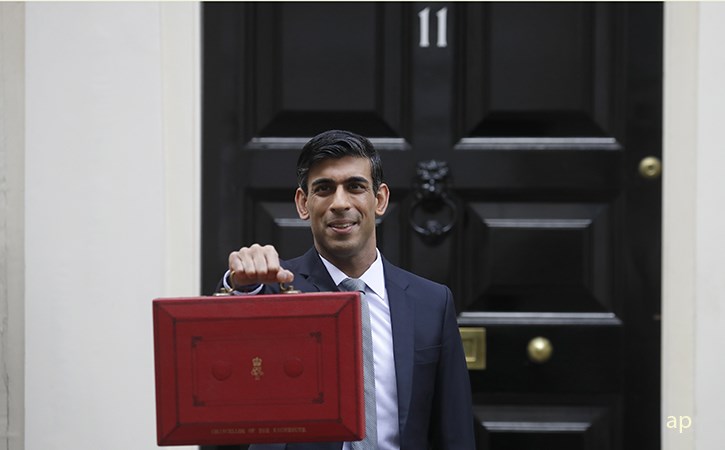
Rishi Sunak’s first outing as Chancellor was a direct response to the coronavirus outbreak and the theme of this year’s Budget was fiscal stimulus and lots of it: £30 billion is earmarked to tackle the economic impact of the Covid-19 crisis, as part of a £175 billion spending plan over five years. Sunak said the UK Government’s response was “one of the most comprehensive policy responses” in the developed world.
The move was co-ordinated with the Bank of England, which cut interest rates from 0.75% to 0.25% just hours earlier; the Chancellor’s insistence that the coronavirus will have a “significant but temporary” effect on the UK economy matches the view of outgoing Bank Governor, Mark Carney.
Sunak was also optimistic that eventually “people will return to work and life will return to normal”. An abolition of business rates for many businesses in the service sector is meant to cushion the blow of any coronavirus-related slowdown for hotels, restaurants and holiday companies.
Junior Isa Limit Doubles to £9,000
Although not mentioned in the Chancellor’s speech, Budget 2020 contained changes that will directly affect savers and investors.
The Junior Isa limit is more than doubling from £4,368 to £9,000 in the new tax year. The motive is to “give children a significant financial asset when they reach adulthood”, according to the Government. Adrian Lowcock, head of personal investing at Willis Owen, says the move “allows parents to save truly life-changing amounts for their children”.
The adult Isa allowance will stay at £20,000 in the 2020-2021 tax year but is earmarked increase to £25,000 in 2024/5 tax year. Iain McCluskey, PwC tax partner, notes that today’s big interest rate cut will reduce incentives for savers to hold cash anyway.
The lifetime pension allowance, meanwhile, has been raised to £1.073 million, but this is in line with inflation rather than a significant uplift. With a nod to doctors on the frontline of the coronavirus outbreak, the “tapered pension allowance” is being raised by £90,000 to £240,000.
This affects how much tax-relief that higher earners can claim on the pensions – and has led to doctors and consultants reducing their hours to stay within the rules. People can save up to £40,000 a year into a pension and enjoy tax relief on the contribution, but this used to be "tapered" down to £10,000 if you earned more than £210,000. Now those earning over £312,000 a year will get a £4,000 allowance.
Sunak said 98% of doctors will no longer be hit by the taper, but Clare Moffat, head of business development at Royal London said the taper should have been removed completely.
Pension Tax Relief Left Alone
The overall message of the Budget was one of increased spending – and that often goes hand in hand with increased taxes. But there was little to explain how the Government intends to finance its spending pledges. Again, pension tax relief for higher earners, which was expected to be in the Chancellor’s sights, has been left alone.
McCluskey said: “The new Chancellor has put substantial reforms to the personal tax system on ice and instead focused his attention on trying to improve the health and wealth of the population. Time will tell whether his interventions were big, bold or brave enough to achieve that aim.”
Tim Bennett, head of education, Killik & Co: “The Chancellor has splashed the cash liberally, but how will he pay for all of his pledges? In his desire to fill actual potholes he may have created some big fiscal ones for himself over the coming years”.
Measures for Drivers - and the Environment
The extra spending is set to upgrade 2020 economic growth from 1.1% (without the stimulus) to 1.4%, according to the Office for Budget Responsibility. The body is forecasting growth of 1.8% in 2021 and 1.5% in 2022, the year that the Government is finally expected to move into budget surplus.
While the freeze on fuel duty remains in place for the 10th year in a row and there are 4,000 miles of new road planned, there were a number of specifically “green” measures to boost the sustainable economy: for example, plastic manufacturers will have to pay £200 per tonne if their packaging contains less than 30% recycled material from April 2022. Other measures include more investments in carbon capture, electric charging points and a “Nature for Climate Fund”.
Some more popular crowd-pleasing measures include spending on affordable housing - housebuilder shares are up today - changes to e-book taxation, freezing on alcohol duties, increasing national insurance thresholds.











.jpg)
















